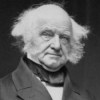Martin Van Buren

Martin Van Buren
Martin Van Buren; December 5, 1782 – July 24, 1862) was an American politician who served as the eighth President of the United States. A member of the Democratic Party, he served in a number of senior roles, including eighth Vice Presidentand tenth Secretary of State, both under Andrew Jackson. Van Buren's inability as president to deal with the deep economic depression following the Panic of 1837 and with the surging Whig Party led to his defeat in the 1840...
NationalityAmerican
ProfessionUS President
Date of Birth5 December 1782
CityKinderhook, NY
CountryUnited States of America
With European powers no new subjects of difficulty have arisen, and those which were under discussion, although not terminated, do not present a more unfavorable aspect for the future preservation of that good understanding which it has ever been our desire to cultivate.
For myself, therefore, I desire to declare that the principle that will govern me in the high duty to which my country calls me is a strict adherence to the letter and spirit of the Constitution as it was designed by those who framed it.
Mutual forbearance and reciprocal concessions: thro' their agency the Union was established - the patriotic spirit from which they emanated will forever sustain it.
The people under our system, like the king in a monarchy, never dies.
No evil can result from its inhibition more pernicious than its toleration.
Our country presents on every side the evidences of that continued favor under whose auspices it, has gradually risen from a few feeble and dependent colonies to a prosperous and powerful confederacy.
It seems proper, at all events, that by an early enactment similar to that of other countries the application of public money by an officer of Government to private uses should be made a felony and visited with severe and ignominious punishment.
The law increasing and organizing the military establishment of the United States has been nearly carried into effect, and the Army has been extensively and usefully employed during the past season.
Those who have wrought great changes in the world never succeeded by gaining over chiefs; but always by exciting the multitude. The first is the resource of intrigue and produces only secondary results, the second is the resort of genius and transforms the universe.
The second, sober thought of the people is seldom wrong, and always efficient.
I tread in the footsteps of illustrious men, whose superiors it is our happiness to believe are not found on the executive calendar of any country.
I tread in the footsteps of illustrious men... in receiving from the people the sacred trust confided to my illustrious predecessor.
I cannot expect to perform the task with equal ability and success.
If laws acting upon private interests can not always be avoided, they should be confined within the narrowest limits, and left wherever possible to the legislatures of the States.